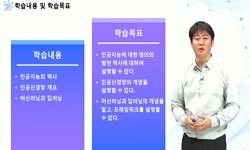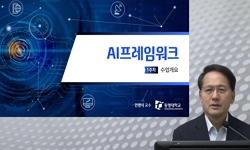Recently, there are many companies that use systems based on artificial intelligence. The accuracy of artificial intelligence depends on the amount of learning data and the appropriate algorithm. However, it is not easy to obtain learning data with a ...
http://chineseinput.net/에서 pinyin(병음)방식으로 중국어를 변환할 수 있습니다.
변환된 중국어를 복사하여 사용하시면 됩니다.
- 中文 을 입력하시려면 zhongwen을 입력하시고 space를누르시면됩니다.
- 北京 을 입력하시려면 beijing을 입력하시고 space를 누르시면 됩니다.
https://www.riss.kr/link?id=A105057064
- 저자
- 발행기관
- 학술지명
- 권호사항
-
발행연도
2017
-
작성언어
English
-
주제어
DGA ; Deep Learning ; Dropout ; Genetic Algorithm ; Overfitting ; AI
-
등재정보
KCI등재후보
-
자료형태
학술저널
-
수록면
74-81(8쪽)
-
KCI 피인용횟수
0
- DOI식별코드
- 제공처
-
0
상세조회 -
0
다운로드
부가정보
다국어 초록 (Multilingual Abstract)
Recently, there are many companies that use systems based on artificial intelligence. The accuracy of artificial intelligence depends on the amount of learning data and the appropriate algorithm. However, it is not easy to obtain learning data with a large number of entity. Less data set have large generalization errors due to overfitting. In order to minimize this generalization error, this study proposed DGA(Dropout Genetic Algorithm) which can expect relatively high accuracy even though data with a less data set is applied to machine learning based genetic algorithm to deep learning based dropout. The idea of this paper is to determine the active state of the nodes. Using Gradient about loss function, A new fitness function is defined. Proposed Algorithm DGA is supplementing stochastic inconsistency about Dropout. Also DGA solved problem by the complexity of the fitness function and expression range of the model about Genetic Algorithm As a result of experiments using MNIST data proposed algorithm accuracy is 75.3%. Using only Dropout algorithm accuracy is 41.4%. It is shown that DGA is better than using only dropout.
참고문헌 (Reference)
1 "http://yann.lecun.com/exdb/mnist/"
2 Lipowski, A., "Roulette-wheel selection via stochastic acceptance" 391 (391): 2193-2196, 2012
3 Marsland, S., "Machine learning: an algorithmic perspective" CRC press 2015
4 Forrest, S., "Genetic algorithms- Principles of natural selection applied to computation" 261 (261): 872-878, 1993
5 D.E. Goldberg, "Genetic Algorithms in search, optimization, and machine learning" Addison-Wesley 1999
6 Kim, Y, J., "Future society change that artificial intelligence technology development will bring" 12 : 52-65, 2016
7 Srivastava, N., "Dropout : a simple way to prevent neural networks from overfitting" 15 (15): 1929-1958, 2014
8 Park, J. S., "Designing Neural Network Using Genetic Algorithm" 4 (4): 2309-2314, 1997
9 Umbarkar, A, J., "Crossover Operators in Genetic Algorithms : a revice" 6 (6): 1083-1092, 2015
10 Mitchell, M., "An introduction to genetic algorithms" MIT press 1998
1 "http://yann.lecun.com/exdb/mnist/"
2 Lipowski, A., "Roulette-wheel selection via stochastic acceptance" 391 (391): 2193-2196, 2012
3 Marsland, S., "Machine learning: an algorithmic perspective" CRC press 2015
4 Forrest, S., "Genetic algorithms- Principles of natural selection applied to computation" 261 (261): 872-878, 1993
5 D.E. Goldberg, "Genetic Algorithms in search, optimization, and machine learning" Addison-Wesley 1999
6 Kim, Y, J., "Future society change that artificial intelligence technology development will bring" 12 : 52-65, 2016
7 Srivastava, N., "Dropout : a simple way to prevent neural networks from overfitting" 15 (15): 1929-1958, 2014
8 Park, J. S., "Designing Neural Network Using Genetic Algorithm" 4 (4): 2309-2314, 1997
9 Umbarkar, A, J., "Crossover Operators in Genetic Algorithms : a revice" 6 (6): 1083-1092, 2015
10 Mitchell, M., "An introduction to genetic algorithms" MIT press 1998
11 Holland, J. H., "Adaptation in natural and artificial systems : an introductory analysis with applications to biology, control, and artificial intelligence" MIT press 1992
12 Whitley, D., "A genetic algorithm tutorial" 4 (4): 65-85, 1994
13 Elyan, E., "A genetic algorithm approach to optimising random forests applied to class engineered data" 384 : 220-234, 2017
동일학술지(권/호) 다른 논문
-
An Effect of Conformity Psychology on the Advertisement Effectiveness
- 국제문화기술진흥원
- Ting Yang
- 2017
- KCI등재후보
-
A Study on Sijo Literature Therapy structuralized in the Rated Codon
- 국제문화기술진흥원
- Park In-Kwa
- 2017
- KCI등재후보
-
Network Analysis on Ageing Problems : Identifying Network Differences between Types of Cities
- 국제문화기술진흥원
- Bojun Seo
- 2017
- KCI등재후보
-
The Effect of Self-Identity on Smart phone Addiction
- 국제문화기술진흥원
- Jung-ae Kim
- 2017
- KCI등재후보
분석정보
인용정보 인용지수 설명보기
학술지 이력
| 연월일 | 이력구분 | 이력상세 | 등재구분 |
|---|---|---|---|
| 2027 | 평가예정 | 재인증평가 신청대상 (재인증) | |
| 2021-01-01 | 평가 | 등재학술지 유지 (재인증) |  |
| 2018-01-01 | 평가 | 등재학술지 선정 (계속평가) |  |
| 2016-08-19 | 학술지명변경 | 한글명 : The International Journal of Advanced Culture Technology -> The International Journal of Advanced Culture Technology |  |
| 2016-01-01 | 평가 | 등재후보학술지 선정 (신규평가) |  |
학술지 인용정보
| 기준연도 | WOS-KCI 통합IF(2년) | KCIF(2년) | KCIF(3년) |
|---|---|---|---|
| 2016 | 0 | 0 | 0 |
| KCIF(4년) | KCIF(5년) | 중심성지수(3년) | 즉시성지수 |
| 0 | 0 | 0 | 0 |






 KCI
KCI






